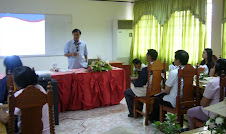You cannot love something that you do not know. It is for this reason that all the stakeholders of the iSchools Project of the Commission on Information and Communications Technology were informed about the project during the community mobilization by the partner state universities and colleges.
The principals, presidents of parent-teacher-community associations and members of the school board of the various recipient schools were oriented on the project objectives and the duties and responsibilities of concerned institutions.
Despite these orientation activities, still, some issues and concerns were raised during the three-day Sustainability Planning Workshop held at the Development Academy of the Philippines Convention Center, Tagaytay City.
Project management
“Is school visitation included in the timetable?,” asked a representative from Batangas State University Laboratory School. Project Manager Camilo Polinga of CvSU replied that school visitations may be announced or unannounced and there would be a monitoring system to be followed.
“Are iSchools beneficiaries allowed to acquire additional units for internet connection?,” asked the Caridad National High School representative. PM Polinga agreed that iSchools beneficiaries are allowed to acquire additional units, but if the units will be connected to the network, speed might be affected. Therefore, proper coordination with the PMO shall be done.
Technical issues
“Is it possible to have two operating systems in each unit?”, inquired one ICT coordinator. “Will the CICT consider the use of a licensed software since would-be users in the community are more knowledgeable in using licensed software than open source software.”
Ms. Melizza Tan of CICT replied that the use of two operating systems would not be allowed. She added that the purpose of using open source software is to maximize the budget in acquiring the number of computer units, since open source software is for free. She also reminded the schools that as partners of CICT, it is their responsibility to provide training in the use of open source software.
Where do we go from here?
There may still be doubts and questions on how the project will proceed but the stakeholders realized the significance of the project and expressed their commitment to be an active partner in bridging the digital divide in their respective communities.
Dec 11, 2007
iSchools: Issues and Concerns
Nov 20, 2007
iSchools writers attend online writeshop
Twenty-nine faculty members from 26 SUCs throughout the country participated in the Online Writing Techniques Training-Workshop conducted by the Commission on Information and Communications Technology (CICT) on November 14-16, 2007 at Hillside Resort, Tiniguiban, Puerto Princesa City, Palawan.
The three-day training aimed to provide basic skills in documenting the activities of the iSchools Project.
Ms. Luz Rimban and Ms. Yvonne Chua, both journalists and faculty members of the University of the Philippines in Diliman, discussed the following topics:
Day 1: The Online Environment and Newswriting
Day 2: Headline Writing, Photojournalism and Feature Writing
Day 3: Opinion Writing and Blogging
Exercises were given in every session and sessions were followed by workshops. The first workshop was on newswriting where the participants wrote a news story about their respective iSchools.
The second workshop was on photojournalism where the participants edited photos (cropping and resizing) using Adobe Photoshop and put captions and keywords. The second output of the workshop was the actual taking of pictures considering the elements discussed and uploading of the edited photos with caption/cutlines to www.flickr.com.
The third workshop was on writing a feature story that accompanies the news story. The participants were instructed to write the title, the summary and subheads if needed and to list the internal and external links as well as the interactive elements.
The final workshop was on blogging where the participants created their respective institutional blogs and uploaded all the revised outputs of the workshop.
Western Philippines University (WPU) hosted the training-workshop.
Nov 16, 2007
Recipient Schools
Cavite:
1. Eastern Bacoor National High School, Bacoor, Cavite
2. Emiliano T. Tirona Memorial National High School, Kawit, Cavite
3. Trece Martires City National High School, trece Martires City
4. Indang National High School, Indang, Cavite
5. Bulihan National High School, Silang, Cavite
6. Cavite State University Science High School, Indang, Cavite
Rizal:
1. Vicente Madrigal National High School, Binangonan, Rizal
2. Angono National High School, Angono, Rizal
3. San Jose National High School, Antipolo City
Quezon:
1. Recto National High School, Tiaong, Quezon
2. Pitogo Community High School, Pitogo, Quezon
3. Calauag National High School, Calauag, Quezon
Marinduque:
1. Mogpog National Comprehensive School, Mogpog, Marinduque
2. Bangbang National High School, Gasan, Marinduque
SPW Open Forum
 A participant raises his concern during the open forum of the Sustainability Planning Workshop held on October 22-24, 2007 at DAPCC, Tagaytay City.
A participant raises his concern during the open forum of the Sustainability Planning Workshop held on October 22-24, 2007 at DAPCC, Tagaytay City.
CvSU conducts Sustainability Planning Workshop
Cavite State University coordinated the iSchools' Sustainability Planning Workshop for the Southern Luzon Cluster on October 22-24, 2007 at the Development Academy of the Philippines, Tagaytay City.
The workshop was participated in by 100 principals, parents-teachers-community association (PTCA) presidents and school board members of public high schools.
Workshop inputs
The sessions were:
• CICT and iSchools Project Briefing
• iSchools CeC Models
• Linking the School and the Community
• Technical Issues in Maintaining an Internet Lab
• Cost of Maintaining an Internet Lab
• Business Planning
Workshop outputs
The participants determined the needs of their respective communities using an appraisal checklist, chose the model to adopt based on their needs, and prepared their business plan based on the model selected. The open forum clarified the issues raised by the stakeholders.
The Southern Luzon Cluster has 42 recipient public high schools assigned to three partner state universities and colleges: CvSU, Batangas State University and Laguna University.




